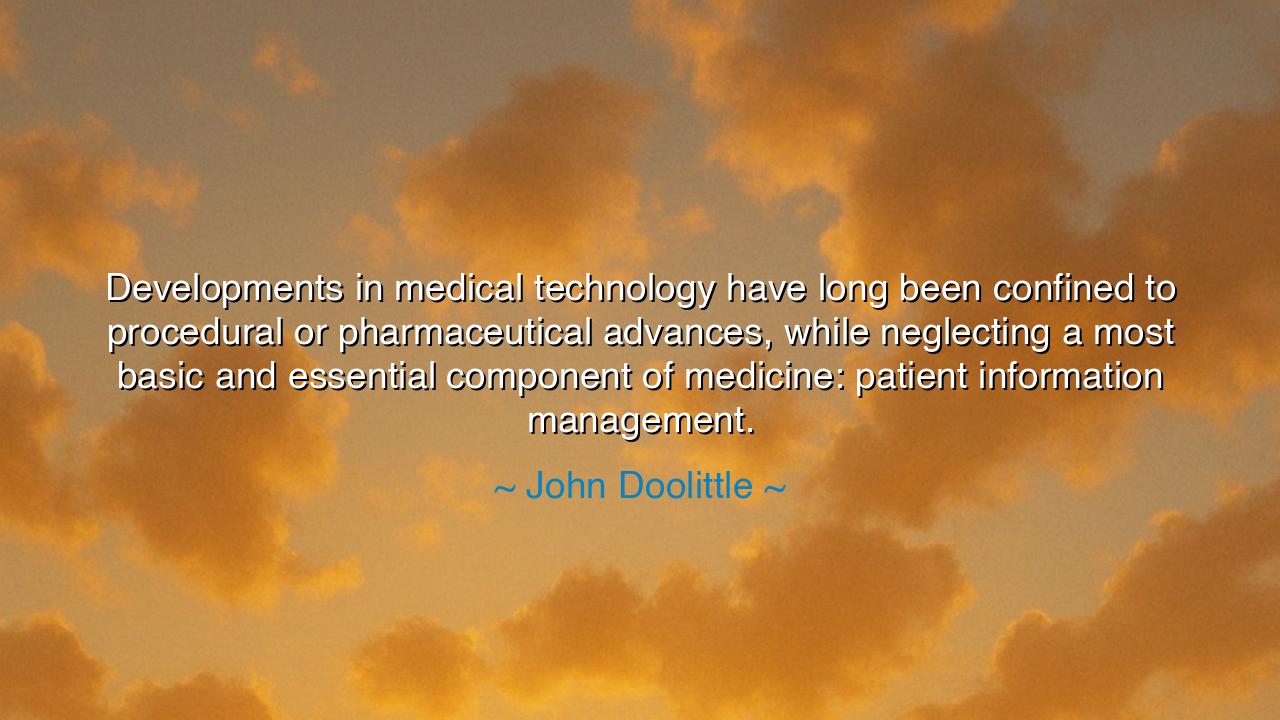
Developments in medical technology have long been confined to
Developments in medical technology have long been confined to procedural or pharmaceutical advances, while neglecting a most basic and essential component of medicine: patient information management.






"Developments in medical technology have long been confined to procedural or pharmaceutical advances, while neglecting a most basic and essential component of medicine: patient information management." — John Doolittle
Hear now the wise reflection of John Doolittle, a man who beheld the wonders of modern medicine yet saw the quiet flaw within its triumphs. His words call us to remembrance — that in the dazzling march of technological progress, one of the most sacred pillars of healing has been left behind: the art of understanding the patient. When he speaks of procedural and pharmaceutical advances, he honors the brilliance of discovery, but when he laments the neglect of patient information management, he reveals the heart of the physician’s duty — not merely to cure disease, but to know the human being who bears it.
From the earliest days of medicine, the healer’s first tool was not the scalpel nor the tincture, but the record — the memory of the patient’s suffering, their history, their pain, their hopes. The ancient healers of Egypt inscribed the ailments of their people upon papyrus; Hippocrates, father of medicine, demanded that physicians keep detailed accounts, for he knew that knowledge without remembrance is blindness. Yet, in our age of machines and medicine made of lightning and code, this ancient practice has been neglected. The healer’s gaze, once upon the person, now too often falls upon the screen. Doolittle’s warning is thus a lament and a prophecy: that without mastery of information, the very soul of medicine may lose its way.
Consider the irony he reveals. In the modern era, humanity has conquered the atom and mapped the human genome; it can transplant hearts and repair the mind with the pulse of electricity. Yet amidst these miracles, communication fails — test results are lost, records are fragmented, lives are jeopardized not by ignorance, but by disorganization. The tragedy lies not in lack of cure, but in lack of connection. Doolittle’s words, though framed in the language of technology, speak to something far more profound: that the health of a system, like the health of a body, depends not only on the strength of its parts, but on the flow between them.
There was a time, not long ago, when a patient’s fate was altered by a missing chart. In 1999, a report by the Institute of Medicine declared that tens of thousands of Americans died each year from preventable medical errors — not from lack of skill, but from failure of information. One hospital did not know what another had prescribed; one doctor did not see what another had observed. In the silence between data points, human lives slipped away. Thus, Doolittle’s quote emerged not from abstraction, but from crisis — from the realization that medicine’s greatest enemy may no longer be disease itself, but disconnection.
In the spirit of the ancients, let us see beyond the machinery. The patient record, properly understood, is not a ledger of numbers, but a living story — the dialogue between healer and healed. To manage that information is to preserve the memory of compassion. It is to ensure that every word spoken, every symptom observed, every treatment given becomes part of a sacred continuity. For medicine, when stripped of memory, becomes mere mechanics; but when rooted in knowledge and empathy, it becomes art once more.
Doolittle’s insight reminds us that the essence of progress lies not in invention alone, but in integration. The stethoscope, the pill, the algorithm — all these are instruments of healing, but without understanding the person they serve, they become hollow. The wise healer must therefore master not only the science of cure, but the stewardship of information — to gather, to protect, and to share it rightly. This is the new oath of our age: that no patient’s voice shall be lost in the labyrinth of data, that no life shall falter for lack of record.
And so, O seekers of wisdom, take this lesson to heart. Whether you are healer, teacher, or leader, remember that knowledge must be connected to compassion. Organize what you know, guard what you learn, and let no detail of another’s suffering fall to neglect. For in the smallest record may lie the key to salvation. As Doolittle teaches, technology may advance the hand, but it is understanding that advances the heart — and only when both work together shall the promise of medicine, and of humanity itself, be fulfilled.






AAdministratorAdministrator
Welcome, honored guests. Please leave a comment, we will respond soon